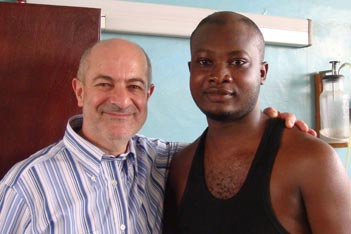A Neurosurgery and Bioethics Pioneer
 Mark Bernstein with a grateful patient in Ghana |
Mark Bernstein will soon be off again - to Accra in the
West African Nation of Ghana on another of his overseas
teaching missions. He has gone on about 15 such
trips, many of them associated with the Foundation for
International Education in Neurological Surgery. He
often brings a team - as many as three surgeons, three
operating room nurses and one anesthetist.
Peter Yao from Toronto General Hospital is one of his
anesthesia colleagues who has organized numerous visits
to central China, one in which Mark participated in
2007. Most of Mark's trips involve hands-on operating
room teaching. "The chemistry of the operating room
is magical and universal." Mark has performed the first
awake craniotomy in Indonesia, China, and Ghana.
This is one of his many innovative contributions to
neurological surgery. Mark loves surgical practice and is
particularly passionate about neurological oncology. He
has performed over 3000 operations for brain tumors -
3 the day before this interview and 2 scheduled for the
following day. He takes pride in the fact that many of
the patients go home to their own bed the same day.
Mark introduced outpatient brain tumor surgery 13
years ago, in 1997. In the fall he will help set up a system
in a Tokyo
|
hospital for awake outpatient brain tumor
surgery. Mark received an innovation grant to support
his novel approach to brain tumors. Over his career
he progressively shortened the post-operative recovery
period from 5 to 4, to 3, to 2, to 1 day and currently
sends patients home the same day. He is a true pioneer
in this area.
In addition to his surgical work, Mark has been a dynamic
teacher, researcher and writer in neurosurgery and in
the area of bioethics. He completed a Masters of Health
Sciences program at the Joint Centre for Bioethics in
2003 and has published about 20 qualitative research
papers on bioethical issues in surgery. Readers will enjoy
his study of patients' views on the role of residents(1).
He has developed a very lively teaching program of bioethics
within the Neurosurgery Division. Neurosurgery
residents have become enthusiastic and reliable participants
in the Clinician Investigator Program Research
Ethics Day each spring.
Mark finds that the residents have become well-grounded
in ethics and less in need of formal teaching than they
were earlier. This a reflection of the successful insertion
of the bioethics lens into the informal curriculum of the
division. Following his neurosurgery residency, Patrick
MacDonald completed the Bioethics MHSc. Program at
Mark's suggestion. Patrick is now practicing paediatric
neurosurgery in Winnipeg.
Mark is married to Lee, a native Los Angelina, and
has three grown daughters, Lauren, Andrea, and Jody
and two Labrador retrievers, Penny and Sherman. He
describes the dogs engagingly in his prolific sideline of
non-medical writing. He loves teaching residents and
fellows and has won the Tovee Postgraduate Teaching
Award, the Ross Fleming Surgical Educator Award, and
many others.
(1) Eva Knifed, B.Sc., Julius July, M.D., and Mark Bernstein,
M.D., M.H.Sc., F.R.C.S.C. Neurosurgery patients' feelings
about the role of residents in their care: a qualitative case study.
J Neurosurg 108: 287-291, 2008
M.M.
|